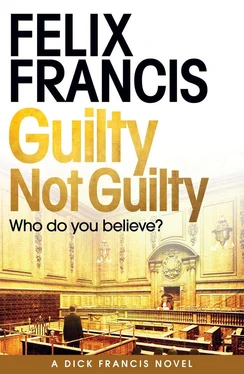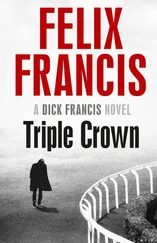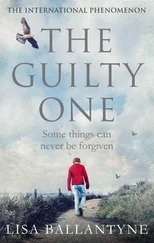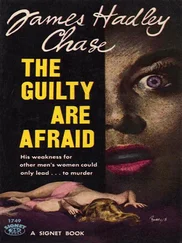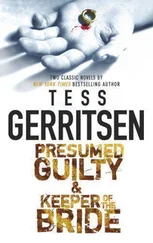‘How did you know where I was?’ I asked as we drove away.
‘Dead easy,’ said one of the constables. ‘We traced your phone.’
That was sneaky. Now I rather wished I had left the charger in the kitchen and let the battery run down. But why? I asked myself. I have no reason to hide. I’ve done nothing wrong. Have I?
It took nearly three and a half hours for us to get back to Banbury, which gave me plenty of time to think but still I couldn’t come up with a single reason why the detective sergeant should consider it necessary to have gone all the way to North Wales to arrest me today when I’d been voluntarily at his police station only yesterday.
He had simply to invite me back and I would have come, meek and mild, to his own front door without the need for histrionics, henchmen and handcuffs.
But we didn’t go in through the police station front door this time. Instead, the cars pulled into the yard behind the building and I was ushered through a rear door into the lobby of the custody suite, where the cuffs were finally removed.
‘Name?’ asked the burly uniformed custody sergeant behind the high desk.
‘Bill Russell,’ I said, rubbing my wrists.
‘William Gordon-Russell,’ said DS Dowdeswell, and the uniformed sergeant typed the longer version into a computer on the desk.
‘Date of birth?’
I told him.
‘Address?’
I told him that too, and he entered it.
‘Offence?’
I said nothing.
‘Murder,’ announced the DS with a bit of a flourish.
The custody sergeant glanced up at him and then back to his screen.
‘Murder,’ he repeated, typing it into the computer. ‘Any medical concerns? Or medications?’
‘No,’ I replied. ‘Other than I take a statin each night for high cholesterol.’
‘Mental health problems?’
‘No,’ I said. There had been plenty of those in our family but they were not down to me.
He typed some more then looked up at the clock on the wall. ‘Mr Gordon-Russell, I authorise your detention here at Banbury at twelve-thirty p.m., in line with the Police and Criminal Evidence Act 1984. Do you need to let anyone know you are here?’
‘Has my solicitor arrived?’ I asked.
‘No one has asked for you. But I can arrange for you to see the duty solicitor if you want.’
‘No thanks,’ I said. ‘I’ll wait for my own.’
The DS next to me snorted slightly as if to imply that he wouldn’t wait too long.
‘Anyone else?’ asked the custody sergeant.
‘No,’ I said. ‘No one else. No one at all.’
The only person I really wanted couldn’t be here; indeed, I was only in this situation because she couldn’t be here.
Oh, Amelia! Help me.
‘Empty your pockets,’ instructed the sergeant.
I took out my wallet, a handkerchief, Douglas’s key and a few coins and placed them in the grey plastic tray provided. Next came the keys to the four padlocks on my house, which caused DS Dowdeswell to raise his eyebrows. He picked them up from the tray.
‘Belt?’ said the custody sergeant.
I removed my leather belt and put that in the tray.
‘Watch?’
It joined my belt.
‘Anything else?’
‘No.’
‘Any drugs?
‘No.’
‘Phone?’
‘I’ve already got that,’ said DS Dowdeswell.
The custody sergeant nodded and made another note in his computer.
‘Remove your shoes,’ he said.
I nearly said please to him, like my grandmother would to say to me as a small child, but the sergeant wasn’t asking, he was ordering.
I removed my shoes and put them in the tray with the other stuff.
I was then searched — thankfully more of a frisking than a full-body strip search. Nothing found.
Next I was photographed and fingerprinted, and then a DNA sample was taken by a none-too-gently swabbing of the inside of my cheek.
‘Sign here,’ said the custody sergeant, pushing a sheet of paper across the desk towards me.
‘What is it?’
‘Custody report. Confirms you have been told your rights.’
I signed even though I didn’t know if I’d been told my rights or not.
‘Cell number seven,’ said the sergeant to another uniformed officer, and I was escorted by him past the line of other doors and into cell seven.
The door was slammed shut behind me, leaving me alone in a space about six feet by ten, painted throughout in calming cream.
A solid bed was built-in down one side of the cell, complete with a thin blue plastic-covered mattress. On the wall opposite the door, there was a small frosted-glass window and, in one corner, a stainless-steel lavatory with no movable seat, plus a tiny washbasin built totally into the wall with pushbuttons for taps.
All of it had been constructed to avoid there being any fixture or fitting from which an inmate could hang themselves.
I kept telling myself that wasn’t a consideration and I should not fret. The whole custody procedure had clearly been specifically designed to unnerve the prisoners — and it was working.
I sat down on the bed, took some deep breaths, and waited... and waited... and waited.
Without a watch, I found it impossible to know exactly how long it was before I heard a key in the door, but it felt like at least half a day, although it couldn’t have in fact been that long — it was still light outside.
‘Your solicitor is here,’ said the policeman who opened the door. ‘She wants to see you.’
She?
I was taken along the corridor to a legal consultation room where a woman in a smart dark-blue suit and white blouse was waiting.
‘Where’s Simon Bassett?’ I asked.
‘He’s in court,’ she said. ‘He sent me instead. I’m Harriet Clark.’ She handed me one of her business cards. ‘I’m a specialist criminal solicitor in the same firm.’
I wondered if Simon Bassett really was in court or whether it was his concerns over a potential conflict of interest that had made him step aside. Either way, Harriet Clark was all I had.
I glanced up at the clock on the wall of the room and was dismayed to find that it had been less than two hours since I’d arrived. Doesn’t time fly when you’re enjoying yourself — not!
‘I assume you haven’t been interviewed yet,’ Harriet said.
‘Not today.’
I explained that I’d been interviewed before, on Friday, but she knew all about that. Simon had given her some notes.
‘I don’t understand why I’ve been arrested,’ I said. ‘It doesn’t make any sense.’
‘No doubt we’ll find out in due course,’ she replied in a rather matter-of-fact tone.
‘I didn’t kill my wife,’ I said earnestly.
‘That’s not what’s important at the present time,’ Harriet said.
‘I assure you, it’s pretty important as far as I’m concerned.’
‘Yes, well, as maybe. But, right now, I’m more interested in deciding our tactics for this interview.’
‘What do you mean by tactics?’
‘Basically, are you going to answer their questions? Or should you reply “no comment” to everything?’
‘I have nothing to hide.’
‘That, again, is not what’s important here. This interview is our opportunity to discover what they have. They might think they will get information from you, but we intend to turn things around and find out something from them, to determine the strength of their case.’
‘They can’t have a case,’ I said. ‘I didn’t do it.’
‘Then we should definitely give them nothing. I strongly recommend you answer “no comment” to anything and everything they ask.’
‘But won’t that make me sound guilty?’
‘It’s not what you sound like in the police interview that’s important. It’s what evidence they have. Remember, we don’t have to prove your innocence — it’s up to them to prove your guilt.’
Читать дальше
